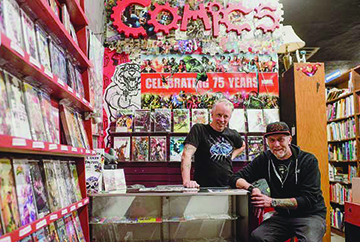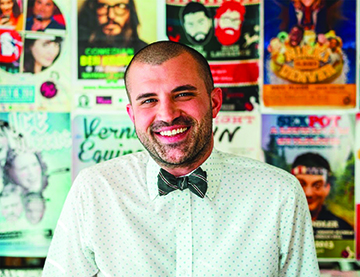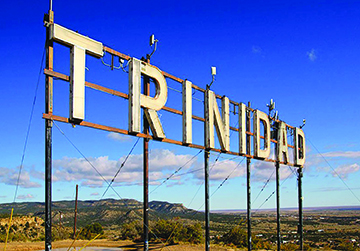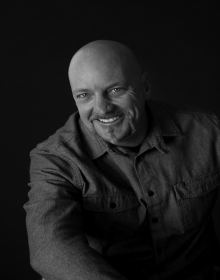“Rather than turning the page, it’s much easier to just throw the book away.” — Anthony Liccione
Sometimes, the greener grass on the other side of the fence is attainable — as long as you’re willing to go 199 miles south (three hours and three minutes by car) to get there. Trinidad, Colorado, is a former mining town with three-or-so centuries of history, a patchwork topography of dilapidation and new development and a lot of potential.
As Denver’s metropolitan growing pains metastasize into cosmopolitan cancers, a few longtime advocates and sworn spouses of the Mile High City are doing the unthinkable — they are eyeing new climes in hopes for a fresh beginning. Once upon a not-too-distant past, Denver was the best kept secret of the Mountain West region. Soon, however, it became a blaring advertisement, then an oversaturated trend, and is now a hyper-capitalized, ultra-modern, less-remarkable version of its former self.
While recent transplants are none the wiser, longtime residents pine for the old times. The days of one-of-a-kind, mom-and-pop joints and relatively safe neighborhoods where you could find a spot to park your car in front of your affordably-priced place to live.
While Trinidad has been patiently waiting like a distressed maiden on the side of the freeway, its rescue had to occur in stronger gestures than just well-meaning sentiments. Those have finally arrived in the strongest form of statement possible: commerce. Movers and shakers not only from Denver but surrounding areas are pouring their assets and creative juices alike into redeveloping a once-thriving metropolis in the effort to contribute to a newly-emerging urban economy.
The Broadway Cabal

Jim Norris and Matt Meygasi of Mutiny Information Cafe are set to open a second location in Trinidad, Colorado.
Jim Norris and Matt Meygasi, co-owners of Mutiny Information Cafe, often look out of their shop’s front window across Broadway at their music venue neighbors, The Hi-Dive. The latter is owned by Curt Wallach and Suzanne Magnuson and has seen South Broadway fluctuate from a booming stretch of business development to its current state of shuttered, Covid-19-induced squalor. The latest commonality between the two teams is not that they share property in an embattled district of Denver, but that they are expanding operations into the untapped and exponentially promising town of Trinidad.
Norris and Meygasi will soon be opening a second location of the locally beloved and internationally infamous Mutiny Information Cafe. Meanwhile, Wallach and Magnuson will be opening a second bar/ music venue in the currently fallow Trinidad Lounge. Wallach and Magnuson have partnered with Denver trailblazer Kayvan Khalatbari as 50/50 owners of the bar and adjacent retail space. Mutiny Information Cafe will be their first tenants.
These migrating enterprises are a testament to the scrappy, independent, forward-thinking character of many Denver DIY businesses, which are disappearing at an alarming rate due to Covid-19 restrictions and the hyper-capitalization that is synonymous with gentrification. In addition to running unique businesses vital to the personality of South Broadway, the proprietors of Mutiny and Hi-Dive possess healthy doses of hope and the desire to work hard to create a better future.
Thus far, the town of Trinidad at large is welcoming new businesses with open arms. Mayor Phil Rico explains, “We are trying to improve our economy and become more diversified. People who want to move down here and open businesses — they are welcome to it. New businesses will boost our local economy and hopefully give residents who are already here some other options that may not be available right now.”
New Beginnings

Kayvan Khalatbari is a Denver business innovator who is expanding his progressive ideas to an untapped market.
Kayvan Khalatbari is a well-known Denver figure in many circles, primarily those of business, art and politics. The former mayoral candidate continues to blaze an entrepreneurial trail across the city, providing jobs, opportunities and outreach. His various ventures include (or have included) a beloved chain of dine-in/takeout joints known as Sexy Pizza, a cannabis dispensary, a consulting business, the widely-revered Sexpot Comedy collective, and more. After years of grassroots community building that was relentlessly countered by an unchecked, city-wide thirst for corporatization, Khalatbari’s gaze began to scan the landscape in search of more fertile grounds for his enterprises.
When asked about the primary drivers that swayed him to expand into Trinidad, Khalatbari explains, “I have trouble sleeping and breathing in Denver, the traffic, and frankly — the number and the type of people that have moved to Denver recently. It’s a lot of folks who seem really excited about the party aspect of Denver while not offering anything to the community, not offering back anything of substance.”
As a front-seat witness to gentrification, Khalatbari pulls no punches. “I’ve seen a lot of things I really enjoyed about Denver fall by the wayside [such as ] music venues, restaurants, and friends moving away. When I’m in Denver, even before the pandemic, I largely just stayed at home and had friends over. There’s nothing unique about it anymore. It’s pretty much in line with other major cities in terms of the types of places it has to hang out in and the types of people you’ll encounter. That’s what’s unique about Trinidad. I think, in a lot of ways, it’s more diverse than Denver.”
Khalatbari clarifies that he is in no way dismissing the city that has been so good to him and is quick to recognize Denver’s enduring merits. “I don’t want to make it sound like I despise Denver. I still love Denver; it has given me everything professionally that I could have ever asked for. I still live there most of the time, my girls still go to school there, I still have businesses there … but it’s just run its course and as I get older it makes sense for me to plant roots in a place that’s a little more long term, you know, for my mentality and my sanity.”
Moving forward, Khalatbari has purchased several properties in Trinidad that require varying degrees of remodeling, repair and TLC. Among these are The First Baptist Church, a large retail space in the downtown area, the Trinidad Lounge, an historic train depot, and a residential property. The local community is tight-knit and includes families and business interests that have been established in the area for generations.
Natural wariness of strangers aside, Khalatbari explains that the reception of himself and other outsiders looking to contribute to Trinidad’s development and revitalization has been overwhelmingly positive. “In the eight months I’ve been here, I’ve had conversations with probably half the city council, and I’ve met with tons of people across the city and for the most part everyone has been very supportive. I’ve been overwhelmed with the people in this town supporting wherever they can, wanting to collaborate, wanting to do good things, to feel the energy — it’s pretty palpable around here I’d say.”
Khalatbari underscores the importance of working with the Trinidad community and other outside investors so that, moving forward, the city as a whole can avoid becoming just another hyper-capitalized, unattainable swath of Colorado gentrification. “There’s a genuine fear of this becoming another inaccessible place in Colorado. One of the reasons I moved here is to see this town that has so much potential, but hasn’t had the investments, come to life while avoiding that sort of an outcome. I work a lot with worker cooperatives and employee-owned businesses. It is capitalism, sure, but it’s the shared economy capitalism. My pizzerias are employee-owned, and I would love to see that kind of model take hold in a place like this.
Wally’s World
Wally Wallace is the Economic Development Director for the City of Trinidad. What the city planners may not have known when they hired him is that he’s also got a creative streak that makes him a seriously valuable asset to the city’s future. A comedian and a musician, among other pursuits, Wallace’s excitement about the city is infectious. He has a litany of proposed events queued up for consideration including Spaghetti and Western festival (an homage to the city’s Italian population), comedy events, themed bicycle rides and a weed-picking enthusiasts’ initiative to rid the town of goat heads.
He mentions Fisher’s Peak State Park — the recently-opened massive open space project that is now the second largest state park in Colorado. “They are projecting that this could potentially bring in up to $15 million into this community per year,” Wallace explains. “We are working on an interstate trail system where people will be able to hike and bike back and forth between Colorado and New Mexico.”
Wallace is responsible for introducing Khalatbari to Trinidad and explains how another Denver innovator — Dana Craw-ford — is making waves locally as well. Crawford is famous for the renowned and highly successful remodeling of Larimer Square and Union Station in Denver. She is currently spearheading the $18M remodel of the Fox Theater in Trinidad, which is a near-exact small-scale replica of NYC’s Carnegie Hall.
Send In The Skilled Tradespeople
Meanwhile, across town, Karl Gabrielson, the director of the Downtown Trinidad Development Group is looking at the big picture. Similar to Mayor Rico, Khalatbari, and Wallace, he acknowledges the concern that updating the city might erase its small-town feel. “We are a long way from there,” he explains. “We are still in the early stages of redevelopment, but the conversation has begun.” He explains. “Trinidad has been boom and bust over and over again and we need to look at long-term sustainability — to develop a business environment that can level out those ups and downs.”
Between an investment group from NOLA planning to build a boutique hotel and Phil Long Ford Dealership owner Jay Cimino sinking millions into the revitalization effort, it has also become apparent that Trinidad needs housing and tradespeople in order to sustain the effort and provide for new arrivals. By and large, Gabrielson is optimistic, saying “Overall, it’s a great time to experience Trinidad. It’s been overlooked for a long, long time.”



